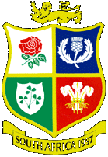
The British Lions in South Africa
by Didds
The first accredited British Lions tour to South Africa occurred in 1924, just over one hundred years from the invention of the game of Rugby Football. There had, however, been two previous tours of British players to South Africa. The first was in 1891, prompted by the successful cricket tour by England there some two years previously. (And possibly the last successful English cricket tour!) The rugby tour was equally successful, with the tourists winning all three test matches, and indeed all nineteen matches played on tour, indicating where the strength in world rugby lay at that time.
A second tour occurred in 1910, and this tour is accredited as being the first really representative tour, receiving as it did the blessing of all four home unions. The power axis of world rugby may have already begun to shift, as the South Africans won the series by two tests to one, and trumpeted the future history of this encounter with all but one reversal in 1974.
Early indications of an English-Celtic rift are evident from these early tours, when the Welsh, Scots and Irish players complained that the team should not maybe be called the English team, but the British team... and by 1924 they became known as the Lions, a nickname invented by the pressmen. To this day that name has stuck with all British Isles & Ireland teams that have toured around the world. Those 1924 Lions failed to win a single test of four, although they did draw one. In 1938, they improved their margin by once again losing a series by two tests to one, and then in 1955 shared the four test series with two test wins each.
The next two tours, in 1962 and 1968, were to prove humiliating, as the Springboks took three tests in each with a draw in each series the Lions' best result, but all was to change in 1974.
Following the successful tour of New Zealand in 1971, Willie John McBride inherited arguably the greatest rugby side the world has ever seen when he captained the Lions in 1974. The All Black "Invincibles" in 1921 would lay a strong claim to that mantle, but the Springboks were a formidable side to tour against. McBride lay down his law early on, before the tour departed, and invited any that were not prepared to forget any gentlemanly feelings to leave the party. None did, and McBride forged a squad that were not prepared to lay down and take the flack as previous British Lions sides had been accused of.
Beginning with the infamous '99' call, and finishing with the destruction of a hotel suite, McBride's Lions kicked, punched, stamped... and ran, and ran, and ran, and beat their Springbok opposition by three tests to none, with the last test drawn. It is difficult not to accept that the Lions did not actually win the fourth test, with a dying minutes try, but the story goes that the referee - a local South African of course in those days - feared for his life had he given it. In retrospect the tour contained much that would be castigated, and quite rightly so, today... the blatant thuggishness, and open vandalism would quite possibly land those players in court today, but the camaraderie and team spirit forged a belief and a brotherhood that was virtually invincible, and shocked the home side's supporters. Even Phil Bennett allegedly hit someone. Once. When no one was looking.
International politics then took a hold. International boycotts around the world heralded the end (almost) of sporting tours to South Africa, just as the country began to show true world domination in almost all sports... in the early seventies, its cricket team decimated Australia, but was not to play an official test match for some twenty years thereafter. The writing had been on the wall during the 1974 series - already the SA cricket team hadn't played test cricket for well over two years - but by the time the 1980 tour left, the anti-apartheid movement was in full swing. It is even possible that a different government in Britain at the time - the Conservative party had won a general election in only 1979 - might have seen the tour canceled, but eventually it went ahead under the auspices of Bill Beaumont, who had just led England to a Grand Slam.
There was to be no fairy tale this time however... the paucity of British rugby, and probably the first real indication of Welsh rugby's decline, was no match for the Springboks, desperate to show that whilst isolated they remained a top rugby force, on top of the game, and on top of their domestic situation, despite the black population of South Africa supporting the Lions vociferously throughout the series.
The South Africans won three tests, whilst the Lions raised themselves for a solitary consolation win. The party returned home, virtually shunned by half of British society, and hardly lauded by the wounded pride of the other half. No further British Lions tours were to be planned to South Africa for another seventeen years; the experience was so bad, in fact, the Lions did not tour for almost another decade.
And so to 1997. In another three months, it too will be history. But in the meantime, this Lions tour re-opens a sporting rivalry that has spanned over one hundred years, and one that somehow embodies the spirit of the British Isles and Ireland touring teams more than any other.
For where better than a Lion to roam, than Africa?